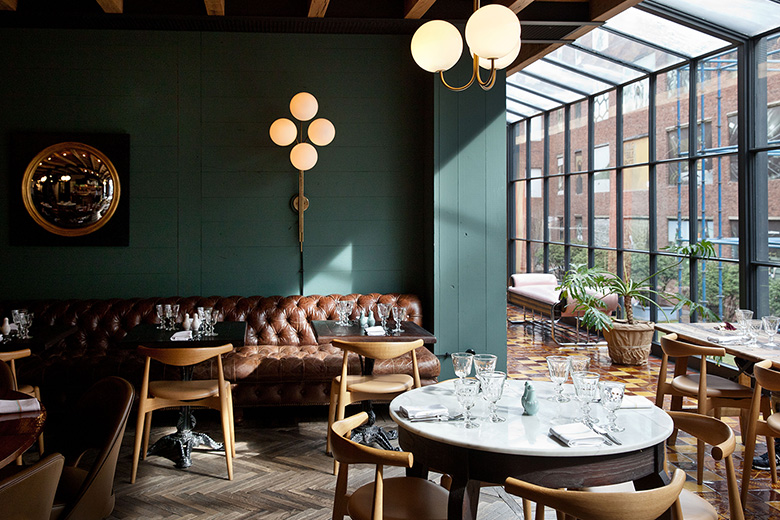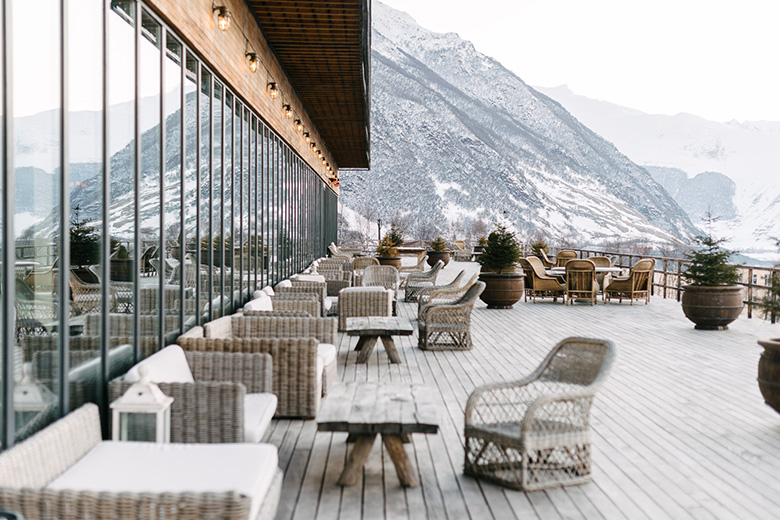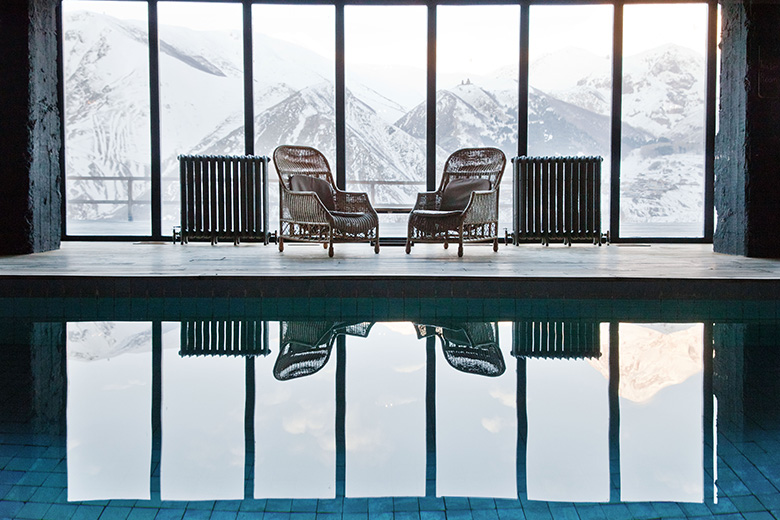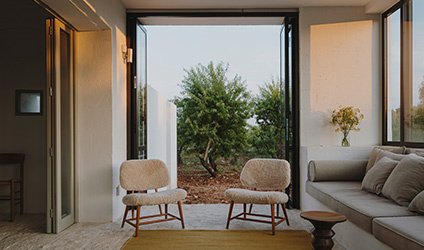Travel
JOURNEYS, STORIES AND DESTINATIONSValeri Chekheria
Creating a global hotspotSince the peaceful Rose Revolution in 2003, tourism in Georgia has been growing year after year. In 2017, the numbers of international tourists reached an unprecedented 7.9 million – double the country’s population. In the 2018, the record was set even higher again, with 8.7 million international visitors arriving to explore the many wonders found in Georgia. The largest and fastest growing company in the Georgian hospitality sector is Adjara Group. With a series of groundbreaking hotels, the company is helping to create the contemporary face of Georgia.
Nick Rice meets Valeri Chekheria, CEO of Adjara Group, to discuss how the company’s creations are leading the way for hospitality in a rapidly emerging global hot spot.
The Rooms Hotel brand is wonderfully conceived and expressed – what was the initial inspiration?
The initial inspiration behind Rooms Hotels was to create a local hospitality experience integrating Georgian gastronomy, arts, culture and design. Recognising the social and cultural capital that Georgia has, we combined the old with new, while staying true to the local aesthetics and customs and creating a luxury lifestyle brand for everybody.
Additionally, we were determined to develop an authentic Georgian service experience that would make us stand out from others. Our team of creative and forward-thinking individuals are central to the philosophy of the Rooms Hotels Brand.

The global travel and hospitality industry has seen record growth and Georgia is benefiting with soaring visitor numbers. Adjara Group has contributed to this success story - after living through tough times, it must be very rewarding to see the fruits of your efforts?
Nothing much was happening in the country when we first started developing our hospitality projects… but through hard work, we created the first Georgian lifestyle brand – Rooms Hotels. The brand Rooms, followed by Fabrika and Stamba, have put Georgia on the world map and started attracting different kinds of local and international guests.

“Word-of-mouth is the most important “technology” in promoting our venues.”

How has the digital age helped with the success of your hotels?
The digital age has certainly created great opportunities to connect with customers and partners worldwide. However, I would like to point out that word-of-mouth is the most important “technology” in promoting our venues. We provide unique experiences for our guests visiting Adjara Group’s hotels and restaurants. Consequently, they fall in love with our brand and share their stories with others.
What have been the most important things in building Rooms Hotels into such an impressive brand?
We conceived hotels that are deeply rooted in their location, architecture and traditions. We have created experiences for those who are curious about the country’s history, gastronomy, art and culture. We wanted everybody, including students, start-up entrepreneurs, businessmen, government officials and artists to feel comfortable and enjoy our spaces.
Ten years ago, smartphones and Instagram didn’t exist. Travellers searched for deals with travel agents and print publications – now, with the emergence of airline and hotel apps, everything has changed. How has technology improved the travel experience?
Certainly it becomes easier to promote our projects through digital platforms. We keep innovating and remain in touch with new technologies. Moreover, Rooms and Stamba Hotels are members of Design Hotels, which actively support us via online reservation systems and global PR strategies. This company currently unites 316 hotels and resorts internationally, which stand out for authenticity, culturally-rooted hospitality, as well as cutting-edge architecture and design.
Has it also caused problems?
The biggest challenge that technology can cause is to diminish human interaction and limit personal touch. Human connections and relationships have been paramount in making our company more successful and we always make sure that this aspect of our hospitality experience is sustained.
“The biggest challenge that technology can cause is to diminish human interaction and limit personal touch.”

Adjara Group is remarkably innovative and The Udabno Project, Farm to Table philosophy, and the Space Farms in Stamba, are all great examples that others in the hospitality sector can be inspired by. Do issues such as environmental sustainability and food security get enough attention in your industry?
Operating farm to table restaurants, the very basis of our philosophy, is impossible without advancing agriculture. For this reason, we have developed the Udabno project, established partnerships with local Georgian farmers and opened the first ever indoor vertical farm in the region – Space Farms located at Stamba Hotel.
Adjara Group has also invested in over 4,000 hectares of land in Kakheti, located in the eastern region of Georgia. The Udabno Project aims to develop the area into farmable land and, with the help of the local population, establish it as an agricultural hub and a sustainable tourism destination. Adjara Group aspires to cultivate a partnership with local farmers and assist in their ongoing growth and development.
To reduce the gap on the Georgian market between the demand for fresh produce and the supply from local farmers, Adjara Group has partnered up with the Georgian Farmer’s Association. Together they have created a platform through which the company has direct access to the best quality produce cultivated by local farmers. The main drive behind this initiative was to support the country’s agricultural sector while providing Georgian farmers with new opportunities and enhancing the gastronomic choices across all of the Group’s restaurants.
Space Farms is a relatively new project. We’re still testing different types of baby greens, leafy greens, edible flowers as well as strawberries and miniature vegetables. Space Farms is already supplying our restaurants as well as our parters’ venues.

Do you find travellers today are more demanding of hotels and luxury brands to be more transparent and diligent about how environmentally friendly they are?
I think travellers are increasingly looking for new and unique experiences rather than spending time “home away from home”. This is the reason our concept is different. We create journeys for our guests across local hospitality, culture, art, fashion, gastronomy and communities.
We provide access to authentic local communities and experiences. Our properties – Stamba, Rooms Hotels, Lolita and Fabrika – have become social and cultural hubs, where both locals and international guests can get to know each other, interact and share experiences.
While tourism is expected to remain strong in Georgia, are there any challenges that could affect growth?
For the past 10 years, tourism has become one of the biggest sources of the country’s income and I can proudly say that we are playing a significant role in the development of this sector. The Georgian government is one of the major promoters of the country as a destination through various international marketing activities. It has also developed some great hospitality projects and initiatives. Some state-owned buildings are sold for a symbolic price, if it serves hospitality and tourism development.
Government institutions also negotiate with different airlines to establish direct flights to Georgia. Public and private sectors often work together to advance and promote the country as an appealing tourism destination. Georgia is rich with history and culture. We have breathtaking nature, a unique language, distinct architecture, music, fashion, a thriving art scene, gastronomy, and one of the most ancient wine-making traditions.
Are there any unfortunate growing pains in an expanding industry?
One of the challenges in the global tourism industry is the development of responsible tourism. Environmental and cultural sustainability should be one of the most important topics to be discussed internationally.
Additionally, tourists visiting the country should be responsible for the environment and appreciate the local culture by abstaining from damaging cultural heritage.
“One of the challenges in the global tourism industry is the development of responsible tourism.”

As our understanding and experience of “luxury” is evolving, moving away from collecting material products to embracing experiences rather than objects, the travel industry has benefitted. What are some of the crucial factors for success in an increasingly competitive field?
We have all become very busy and cannot afford losing time by experimenting with different destinations and getting disappointed. We appreciate all the details. When our guests choose Adjara Group’s hotels and restaurants, they give us their precious time and the money they earn. In return, we make sure that the best experiences are provided for them. Considering that travellers around the world have limited time and too many choices, we cannot afford to not provide them with the best the country has to offer.
Could you choose one word to describe luxury now?
Two words. Adjara Group.
What is one comfort that you couldn’t do without when travelling?
Finding my own space – where I feel at home yet discover something new.
I know you can’t predict the future, but how do you see the evolution of luxury?
Luxury is going to be all about healthy products and experiences.
All photographs courtesy of Adjara Group

